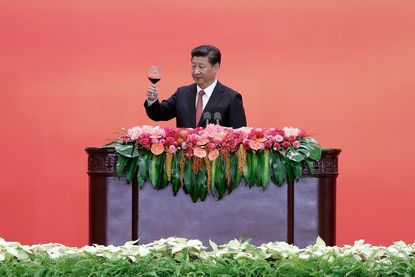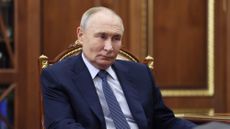China is now just another autocracy
On the long-lasting consequences of Xi Jinping's power grab


The past few years have been sobering for advocates of democracy. Fragile, new democracies like Russia, Turkey, and Hungary succumbed to populist, autocratic leaders. Then more established democracies like the United States fell victim to the same political tendency, while countries like the U.K. and Germany slid into sclerotic dysfunction. Traditional parties in conventionally liberal political systems increasingly struggle to keep a hold on power, and to wield it effectively once it is grasped.
This sort of political environment would seem tailor-made for a new ideological challenger. And the world had one ready at hand. In the same period when Europe and America struggled to dig their way out of the financial crisis, the People's Republic of China invested in massive internal improvements that bolstered domestic productivity and demand. Then they exported their new capacity in construction and engineering, investing in infrastructure across Asia and Africa, building important new relationships with future clients and customers. China began to tackle its longstanding environmental problems and invest in the technologies of the future. Finally, under President Xi Jinping, China's government took direct aim at the rampant corruption that was progressively undermining the legitimacy of the regime.
As the United States and the European Union struggled, China was making a new bid for global leadership, and presenting a new political model, led by a party that rejected free discourse and open political competition in favor of a meritocratic and nationalistic ethos with Confucian roots.
Subscribe to The Week
Escape your echo chamber. Get the facts behind the news, plus analysis from multiple perspectives.

Sign up for The Week's Free Newsletters
From our morning news briefing to a weekly Good News Newsletter, get the best of The Week delivered directly to your inbox.
From our morning news briefing to a weekly Good News Newsletter, get the best of The Week delivered directly to your inbox.
China continues to press this case at home and abroad, claiming its own system is more efficient and capable than Western democracy. But this week, it dramatically undermined any such argument by investing President Xi with far greater personal power than his predecessors. The consequences are likely to be long-lasting.
The Chinese Communist Party's decision to recommend changing the constitution to allow President Xi to remain in power for more than two consecutive terms was widely anticipated — though not necessarily expected to occur so soon. But the move is still extraordinary — and potentially quite damaging. One risk is that the assertive Chinese president, now unencumbered by domestic rivals, could rashly provoke a conflict with China's neighbors — or the United States. From the start of his presidency, Xi has pursued a bluntly confrontational course over Chinese prerogatives in the South China Sea, and he will now face few if any institutional checks should he choose to go further down that road.
Arguably, though, the far greater risk is domestic.
Without free elections, planning for leadership succession in China is the responsibility of the party. As Xi has tightened his control over the party, while simultaneously tightening the party's control over the country's political life, he has made himself increasingly responsible for planning his own succession. Now, by changing the constitution to allow him to remain in power indefinitely, he has turned any such planning by other party members into a threat to his own rule. China's government runs the risk of devolving from something fundamentally institutional — unfree, but subject to processes that allow for interest-group competition and rational planning — to something fundamentally autocratic.
Autocracy is not some new model of governance, but one of the oldest, most basic, and most brittle. While autocrats appear to have nothing to fear from competition, in practice they have more to fear than leaders in more robust institutional systems, because all that sustains them is their own personal power. Thus, to an autocrat, the mere existence of other power centers, or even the presence of highly capable lieutenants, can come to be seen as potential threats. And once a country's institutions have become corrupted by autocracy, it is exceptionally difficult to restore them without ousting the autocrat, which raises the stakes of domestic discontent further still. It was former Chinese leader Deng Xiaoping's experience with the decrepit Chairman Mao Zedong's later years that inclined him so strongly toward institution-building initiatives like limited terms that would prevent a recurrence.
A politically brittle China, with degraded mechanisms for gathering and processing correct information about its own condition and increasingly opaque to outside observers, will be incapable of exercising global leadership commensurate with its massive economic power. China doesn't have to regress as far as North Korea for the concentration of power in the hands of one man to stymie the development of peer-to-peer international ties in business, academia, or the military. Regardless of whether it pursues a more belligerent foreign policy, and regardless of whether President Xi himself proves more erratic with time, China will likely be viewed as a less-predictable and less-reliable actor on the global stage, if only because with weakening institutions it will be less and less able to form and maintain strong institutional ties abroad.
Meanwhile, from the perspective of soft power, countries from Chile to Uganda with past experience of autocratic rule are less likely to see Xi's version of the Chinese model as one to be emulated than as a cautionary tale.
Managing China's political devolution would have been a difficult problem in the best of circumstances. How much more so when the democracies of the West are undergoing a destructive political devolution of their own.
Sign up for Today's Best Articles in your inbox
A free daily email with the biggest news stories of the day – and the best features from TheWeek.com
Noah Millman is a screenwriter and filmmaker, a political columnist and a critic. From 2012 through 2017 he was a senior editor and featured blogger at The American Conservative. His work has also appeared in The New York Times Book Review, Politico, USA Today, The New Republic, The Weekly Standard, Foreign Policy, Modern Age, First Things, and the Jewish Review of Books, among other publications. Noah lives in Brooklyn with his wife and son.
-
 Why Assad fell so fast
Why Assad fell so fastThe Explainer The newly liberated Syria is in an incredibly precarious position, but it's too soon to succumb to defeatist gloom
By The Week UK Published
-
 Romania's election rerun
Romania's election rerunThe Explainer Shock result of presidential election has been annulled following allegations of Russian interference
By Sorcha Bradley, The Week UK Published
-
 Russia's shadow war in Europe
Russia's shadow war in EuropeTalking Point Steering clear of open conflict, Moscow is slowly ratcheting up the pressure on Nato rivals to see what it can get away with.
By The Week UK Published
-
 Cutting cables: the war being waged under the sea
Cutting cables: the war being waged under the seaIn the Spotlight Two undersea cables were cut in the Baltic sea, sparking concern for the global network
By The Week UK Published
-
 The nuclear threat: is Vladimir Putin bluffing?
The nuclear threat: is Vladimir Putin bluffing?Talking Point Kremlin's newest ballistic missile has some worried for Nato nations
By The Week UK Published
-
 Russia vows retaliation for Ukrainian missile strikes
Russia vows retaliation for Ukrainian missile strikesSpeed Read Ukraine's forces have been using U.S.-supplied, long-range ATCMS missiles to hit Russia
By Arion McNicoll, The Week UK Published
-
 The teenage 'maths prodigy' who turned out to be a cheat
The teenage 'maths prodigy' who turned out to be a cheatUnder The Radar Jiang Ping defied expectations in a global competition but something wasn't right
By Chas Newkey-Burden, The Week UK Published
-
 Why China's young people are rejecting marriage
Why China's young people are rejecting marriageThe Explainer Changing attitudes and a slowing economy are contributing to a slump in weddings
By Chas Newkey-Burden, The Week UK Published


